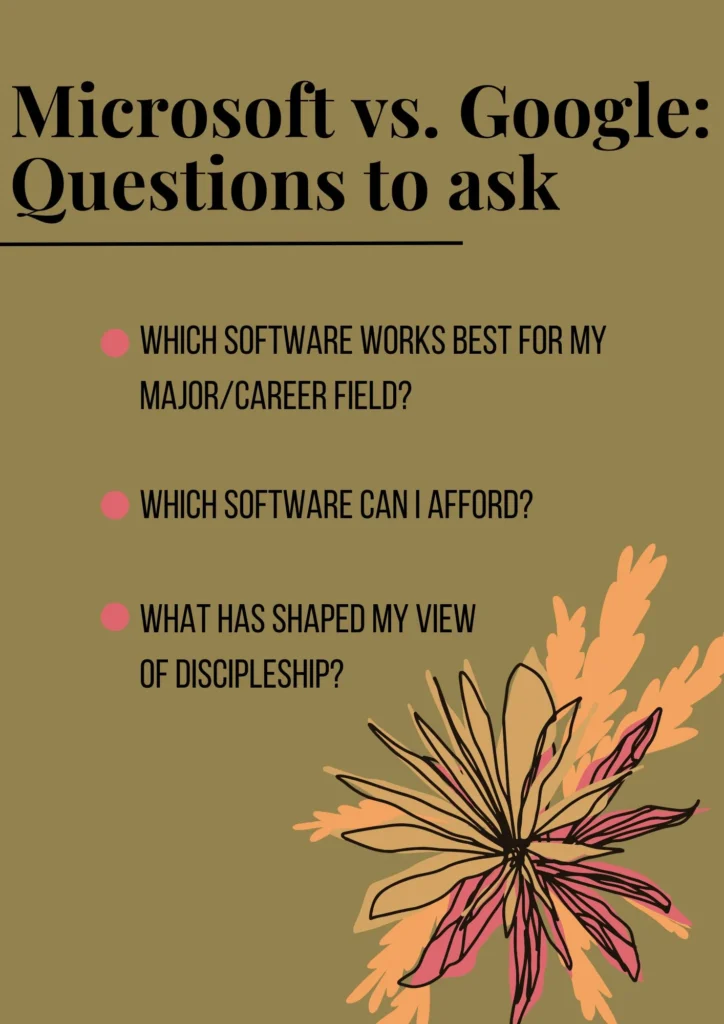
Microsoft vs. Google: Is there a right or wrong choice?
Caroline McNeely, Staff Writer
His fingers pressed into the little squares of letters on a board that lit up out of excitement at the thought of creativity. He felt the slight breeze of air as the cursor on the screen searched for a platform that would best suit his need to write the five-page essay due in an hour.
College is not the same as was 20 years ago. At least that’s what parents tell their college kids today. The question to ask isn’t if technology is actually useful in education, but how can college students use it well and take advantage of its features?
With the rapid growth of technology comes the need for students to stay informed on how different platforms increase their learning efficiency.
Deborah Batson, professor at North Greenville University, has been a Microsoft certified professional for years and researched and wrote about using technology to teach technology. Batson worked in the corporate world for 20 years, and now works at North Greenville teaching computer science and informational technology courses for students.
When it comes to Microsoft, Google, Apple and every platform that has features to use for educational purposes, they offer similar programming but differ in ways as well.
For example, Apple apps have climbed the ladder in recent years with apps that some students use for educational purposes. Batson, however, said, “I think it’s great that we do have the software and that it’s available. Students come in with their Mac computers and they have the software that they need, but it’s just not the same as Microsoft Office. It still doesn’t have the same capabilities.”

Many students come into Batson’s classes that have Mac computers, which means learning a new program, such as Microsoft, may be difficult for a student who is unfamiliar because of Mac’s programming.
Microsoft and Google seem to the be the leading platforms for students who are looking for efficiency and ease in their workload. It seems to depend on the person’s preferences when deciding if Microsoft is easier to use than Google, or vice-versa. Let’s look at what these differences may entail for students looking at the best program to use.
“There’s wonderful collaboration in Google apps, but when it comes to preparing students for the working world, Microsoft is still going to be the leader. Although Google apps have come up with some new features that are making them more competitive, Microsoft Office has been the leader in business apps for a long time,” Batson said.
With Google apps you can find apps such as Google slides, Google sheets, Google docs, Google classroom and so much more. Microsoft, however, seems to have put its foot in the door sooner than Google, and according to Batson, has been ranked number one for much longer in the corporate world.
Batson believes Microsoft is leader above other programs because it offers Microsoft Office, which includes Word, Excel, PowerPoint, Outlook and many others that allow for working professionals and students to use to their advantage as well. Both Google and Microsoft offer programs that can help students soar in their education, but it really comes down to choosing the best fit for the student.
Julia Babun, sophomore marketing major at North Greenville University, has had experience in collaborating with classmates in Google and Microsoft in her business communication class. Babun was paired with a group of girls in her class that were all hard workers. The result of the project from Google Slides looked as if only one person had made it, when they collaborated on it together.
Babun said, “I think Google Slides is very beneficial for a group project since it’s easy to write on one document and share it with people, but it can get very challenging when our ideas aren’t meshing and are choppy. But if everyone has the same theme and goal, then it can work really well.”
If a student is working on a group project or paper, it would only make sense to find a feature that would make collaborating with others much easier. Luckily, both Microsoft and Google have features that accommodate this issue, such as reviewing, commenting and editing buttons.
Many students have found this to be the main reason why using Google is much easier than Microsoft. Students have found the Google Scholar search engine to be helpful in collaborating with classmates as well. For example, Grant Evans, sophomore cyber security major at North Greenville, said, “Google has a lot of information that you can find more easily because of how the platform is set up. Google has a whole search engine dedicated to peer review articles that we are able to use for classes that require peer reviewed articles.”
Collaboration in the college world is common, so this feature may be the winning factor for certain students. Google offers many apps that include collaboration for papers, presentations and spreadsheets.
Batson said, “In the education world, Google apps are easier to work with in collaboration. So an entire class can work together on a project. While Microsoft does have some collaboration capabilities, those capabilities are just easier to use with Google apps.”
For Microsoft, students can use collaboration features to work together in the same workspace, but it is not the live editing feature that Google offers. Microsoft, however, has options and features that may be more appealing to other students.
Shane Carpenter, sophomore business management major at North Greenville, said, “I use Microsoft because of the accessibility of features versus Google. If Microsoft didn’t have OneDrive, I probably wouldn’t use it. OneDrive saves my documents over the internet which is super helpful for my usage.”
OneDrive is a feature that allows students to automatically save information without worrying about losing any hard work they have accomplished. OneDrive saves everything within the Microsoft Office sphere, which is helpful for students working on a range of projects for classes and it saves storage space on students’ computers as well.
For sophomore Interdisciplinary studies major at North Greenville, Cecelia Sundell, she prefers using Microsoft to work with her peers, but her peers prefer Google. Sundell said, “I usually Microsoft for most things, I just like how it formats better and is a lot easier. but everyone uses Google when we do group projects. I just can’t stand it because I feel like when I make a change, someone changes it back and I just feel like one person needs to be in charge to make it organized.”
Now, the question for college students always boils down to one thing: how much will it cost? Students attending North Greenville receive free access to the Microsoft Office apps and programs, and the majority of Google’s apps and features are free too.
The money issue comes into play when students enter the corporate world and no longer benefit from North Greenville’s free access. Batson said, “Google Apps have recently added subscriptions to where you can pay and get some additional features, but they still don’t have the same features that Microsoft has. Microsoft for an individual is around $10 a month.”
Microsoft has multiple packets of what programs you can pay for your use, and the cost ranges from $6 to $22. These packages are for businesses and personal use of all the Microsoft software, or whichever ones included in the purchased package deal.
With the cost factor out of the picture for students, choosing which platform is the best fit for them comes down to preferences. Another idea students should keep in mind is that it will most likely change when you enter the corporate world after college.
“Microsoft Office is useful for all majors unless you’re education. Now, if you’re education you’re going to want to know Google apps inside and out, because most schools provide that for their students,” said Batson.
There are benefits to using both platforms, and not just one is the right choice. The preferences of the student will be the determining factor in the game of educational technology. These platforms will continue to release new features that cater more, or less, to college students. May the best player win.
